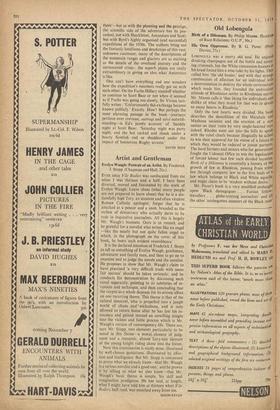Artist and. Gentleman
Evelyn Waugh: Portrait of an Artist. By Frederick J. Stopp. (Chapman and Hall, 21s.)
EVER since Vile Bodies was confiscated from me when I was thirteen and a half, I have been diverted, moved and fascinated by the work of Evelyn Waugh. Leave alone (what many people are not prepared to leave alone) that he is a dis- dainfully high Tory, an insistent and often virulent Roman Catholic apologist; forget that he is attacked as a poseur and a snob, branded as the outlaw of democracy who actually dares to be rude to inquisitive journalists. All this is largely Mr. Waugh's business. Ours is to remark and be grateful for a novelist who writes like an angel —like the nearly but not quite fallen angel to which, in the photograph on the cover of this book, he bears such evident resemblance.
It is the declared intention of Frederick J. Stopp to tell us something of Evelyn Waugh, gentleman, adventurer and family man, and then to go on to examine and to judge the novels and the novelist. He proposes to show that Mr. Waugh's claim to have practised 'a very difficult trade with some fair success' should be taken seriously; and he conducts his demonstration by discussing each novel separately, pointing to its subtleties of in- vention and technique, and then concluding that the corpus as a whole depends for its artistic effect on one recurring theme. This theme is that of the natural innocent, who is propelled into a jungle world of chaos sand' wickedness, and is only allowed to return home after he has lost his in- nocence and gained instead an unwilling insight into the vicious and futile process which is Mr. Waugh's version of contemporary life. There are, says Mr. Stopp, two elements particularly to be noted in this theme—a moral. element of judg- ment and a romantic, almost fairy-tale element of the young knight riding alone into the forest.
Now this examination is nicely done, illustrated by well-chosen quotations, illuminated by affec- tion and intelligence. But Mr. Stopp is concerned to prove what we already know—that Mr. Waugh is a serious novelist and a good one : and he proves it by telling us what we also know—that Mr. Waugh's basic theme is simple, his skill and imagination prodigious. He has said, at length, what I might have told him at thirteen when Vile Bodies, half read, was snatched away from me.
SIMON RAVEN


































 Previous page
Previous page